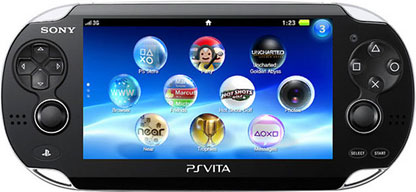Adobe Flash continues to lose support among popular electronics
manufacturers, as Sony has also decided to move on without Adobe Flash
initially with the PlayStation Vita portable gaming device, due in the
US during the first quarter of 2012. The Vita is the successor to the
PlayStation Portable (PSP), which was released in 2005. As Frank
Cifaldi from Gamasutra points out in
his article, the PSP also lacked support for Flash initially.

There will be no initial support for Flash on the PlayStation Vita's
browser.
Steve Jobs fully understood that Adobe never updated Flash to work
properly on mobile devices, and his decision to exclude Flash content
on iOS is a clear testament to his Thoughts on
Flash.
As Adobe continues to ignore the needs of the ever-increasing demand
for delivering mobile content, even Microsoft seems to have plans to
pull the plug on Flash with upcoming Internet Explorer version 10
(currently available for test drive with Windows 7 and
newer). This new version of IE is designed to work with the Metro UI of
Windows 8 and in many ways mimics Lion's approach of integrating the
feel and look of a mobile OS into a full-fledged home and business
operating system, while streamlining it by removing all of the
unnecessary bloat and plug-ins.
You can't fault Microsoft for trying to stay with the current trends
and attempting to come up with an answer to iOS, but it still has a
long uphill battle in recapturing a piece of the mobile OS community
(after stagnating with Windows Mobile) in order to reap the same
benefits Apple has received with the constant evolution and sleek
integration of iOS.
Apple, Sony, and Microsoft have made their point clear with their
business decisions to become less and less dependent on Flash. As such,
one may wonder how much time Flash has left. Are some of these
decisions rumblings of the beginning of the end for Flash and the start
to a new era where all content is delivered via HTML5?
PowerPC Mac Owners Rejoice!
For PowerPC Mac owners, these developments are a blessing in
disguise. Mac OS X 10.4
Tiger and later have support for HTML5 in several browsers such as
Firefox
3.5 and 3.6, TenFourFox (current
version is equivalent to Firefox 7),
Opera 10, and Safari (version 4.0 and later). Unfortunately, when
Flash 10.2 was released in February 2011 (the current version as of
this writing is 11.0), PowerPC support was dropped, and many of the
same Macs that can display HTML5 content will not display the exact
same content delivered in Flash. This is especially frustrating for G5
owners who definitely have enough CPU and GPU processing power to
handle streaming 480p and most 720p video content delivered in
HTML5.
As HTML5 content grows and as Flash support declines, I would expect
a brief resurgence where web content delivered exclusively in Flash
10.2 and later that is not being displayed on PowerPC machines will
become widely available in HTML5 - until HTML6 arrives and becomes
standard (possibly requiring more modern hardware) that could leave
these machines behind again.
At the very least, though, when Flash goes away, if you own a
PowerPC Mac and begin to worry how much practical life (on the Web)
your machine still had with Flash eliminating support with version 10.2
and later, fret not. As Adobe gets the tables turned on them and as
Flash loses relevancy, expect your PowerPC machines to benefit (at
least for a little while) in a revival of capabilities when it comes to
receiving streaming web content.

Dan Bashur lives in central Ohio with his wife and children. He uses various PowerPC G3 and G4 Macs running Tiger and Leopard. Besides finding new uses for Macs and other tech, Dan enjoys writing (fantasy novel series in the works), is an avid gamer, and a member of Sony's Gamer Advisor Panel. You can read more of Dan Bashur's work on ProjectGamers.com, where he contributes regular articles about the PSP, classic gaming, and ways you can use Sony gaming hardware with your Mac.



